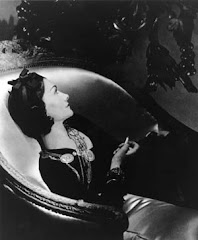
I am not a vegetarian, or a Buddhist or a pacifist, but the sight of thousands of people marching through the streets of Khartoum today, carrying knives, axes and clubs demanding that 54-year-old Liverpool primary school teacher Gillian Gibbons be executed by firing squad for allowing her class to name a teddy-bear Mohammed, is leading me to consider applying for membership in the Vienna Vegetable Orchestra. There is nothing you can do about these fired-up hot-heads, except drown out their cries for vengeance by music made from asparagus.
Citing Elias Canetti's Crowds and Power, George Szirtes once remarked to me that crowds are not really human. The lynch mob certainly is not.
Friday, 30 November 2007
Root causes and other tuberous matters
Posted by
Linda Grant
at
13:59
3
comments
![]()
![]()
![]()
![]()
Labels: Music, Opinions, Vienna Vegetable Orchestra
How we dress in London, and LA

Emma Forrest, writing in the Guardian observes, of her return to London after a year in LA:
Riding the tube again, I feel intimidated by your outfits. You British ladies wear high heels with knee socks, pencil skirts and complicated makeup. During the day! After a year as an Angeleno I've figured out where Posh is going wrong. She looks out of place because you just don't wear fancy outfits during the day in LA, especially if you're as ambitious as she is. Dressing down implies that dressing up is a facet of your job, at which you are incredibly successful. So much so that come the awards season you are up to your ears in Valentino sheaths and are therefore relieved - no, delighted - to wear nothing but terry towel the rest of the year. Dressing up outside the context of a party/ceremony/gala suggests you need to invent your own reason to dress up because people aren't rewarding you.It is my observation that we dress better in London than in the US, where clothes are both more casual and more conservative.
But Emma goes on to quote . . .
. . . LA actress Rose McGowan [who] thinks "that tired old cliche, 'Everyone in Los Angeles dresses down', is just that. A cliche. What people who aren't in the public eye don't understand is that you need armour, and clothing, hair and makeup can protect you against the world."
 A crucial observation. In London, this vast, complicated, chaotic city, clothes are also your armour. Two fashion editors told me recently that they loved Alexander McQueen because his clothes felt like armour; they were a carapace. They felt they could do battle with their bosses in them. The rich and powerful don't need armour. Look at how Bill Gates dresses.
A crucial observation. In London, this vast, complicated, chaotic city, clothes are also your armour. Two fashion editors told me recently that they loved Alexander McQueen because his clothes felt like armour; they were a carapace. They felt they could do battle with their bosses in them. The rich and powerful don't need armour. Look at how Bill Gates dresses.
Posted by
Linda Grant
at
08:19
5
comments
![]()
![]()
![]()
![]()
Labels: Alexander McQueen, Elements of style
The puritan and the handbag

My friend Norman Geras, Emeritus Professor of Government at Manchester University and sole proprietor of Normblog, essential daily reading for those grappling with the moral complexity of the post 9/11 world, emails me to say:
I follow the link to an article which is a nine-rule guide to buying a handbag. The author writes:Your sort of thing, Linda...
http://www.alternet.org/story/65680/
If one thinks anthropologically, handbags may be a vestigial expression of women's biological desire to nest. We need to feel that all the necessities of life are immediately within reach -- and these necessities have increased in number as civilization has grown more complex. By the same token, the handbag may only be a shrewd invention on the part of patriarchy to keep women enslaved. The dead white male who invented it knew that it was an accessory that we wouldn't be able to resist.
She follows with some some mundane observations about size (not too big, not too small), price (not to expensive, not too cheap), containing pockets for phone and reading glasses, and truly my eyes glazed over and I was skimming the rest until I came to the comments:
I know, progressives are dull and we never have any fun because we're always worrying about poverty and melting ice caps--the people who clear the room at a party. And let me say we usually don't give a f**k about handbags and the Cosmo wisdom that goes with purchasing them. The real progressive angle on handbags is how many people run their credit cards up trying to afford these $5,000 poor excuses for status symbols. Or the physical strain they're putting on women's shoulders and backs. Honestly, let's leave glorification of capitalism to Vogue. Notice, I don't need any help buying the perfect hemp backpack!and
What kind of moron Susie Q is worrying about handbags at a time like this? Some trust fund, clueless, child of liberal money. This is worthy of a Christian Republican knitting circle news letter! This is pathetic. If alternet keeps posting this crap I'm ditiching [sic] them.and
The fact that the richest country in the world has homeless women living on the streets ---this is funny?Everything these messages contain, this site is designed to combat: the notion that only frivolous individuals care about what they wear. It is a frequent self-delusion indulged in by the self-righteous that they believe they are judged solely on the quality of their argument. They are not. They are judged also by their appearance. Regarding their physical selves as a fleshy envelope holding in their important thoughts, they roam around the world hectoring others, unaware that their listeners' minds are only half-attending to what they saying, while the other half wonders why someone with so little aesthetic sensibility, so limited an understanding of their own bodies, -its proportions, colouring etc - could be so profoundly convinced of their own correctess.
You know what-we deserve Bush.
Get a bag from the Surplus store-those green Army bags last forever. Stuff it with energy bars to hand out to those homeless women you make fun of. Give the money you don't spend on a fancy bag to a homeless women's shelter.
Here is something we can all do. Don't carry a politically unaware bag. They could be the new bumper stickers.
This is a picture of Mrs Jellyby in Dickens' Bleak House, a lady neglectful of her own dress and her own children, in the pursuit of causes:

Posted by
Linda Grant
at
07:15
13
comments
![]()
![]()
![]()
![]()
Subscribe to:
Comments (Atom)

